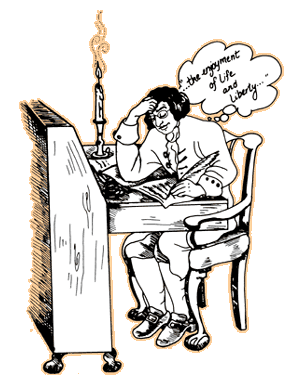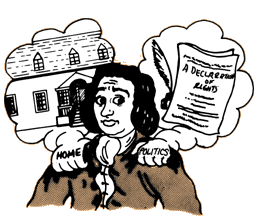Colony into Commonwealth
Lesson One
GEORGE MASON'S
REVOLUTIONARY WORDS
|
READ AND DISCUSS
(in small groups)
I. Can you imagine writing something so important that everyone would be talking about it for centuries? Some of what George Mason wrote was just that important. His most famous document, the Virginia Declaration of Rights (VDR), has influenced the way people think about government in Virginia, in other states, and in the distant country of France.
From about 1765, Mason had a big role in the momentous events taking place in Virginia. He disagreed when Great Britain taxed his colony without the approval of the local government. He pointed out that this practice went against the British Constitution, which said that the people should have a voice in law-making. Mason stated his opinion in a letter he wrote to the Public Ledger, a newspaper in London, in June 1766. |
 |
Mason did not sign his name to the letter to the Public Ledger. He wrote only, "A Virginia Planter." Why do you think he signed the letter this way? Was this a good idea?
|
| II. In May 1774, the British government closed the port of Boston and dismissed the local government in Massachusetts. Colonists up and down the coast protested. In Virginia, Mason and George Washington expressed their objections by writing the the Fairfax Resolves. They stated that Great Britain was treating the Colonies unfairly. They recommended that the colonists send a petition to King George asking for these wrongs to be corrected. Mason and Washington also went a step further. If Great Britain did not respond favorably to the petition, they said, "There can be but one Appeal." |
|
What do you think Mason and Washington meant by the statement, "There can be but one Appeal"?
|
| III. Of everything written by Mason, he is best-known for the Virginia Declaration of Rights (VDR). Mason wrote this document as a delegate to a colony-wide convention held in Williamsburg, Virginia in 1776. The document listed the rights of people in Virginia.
The VDR contained bold, exciting ideas. Mason stated that "all power is vested in [given to], and consequently derived from [comes from], the people." In other words, a government runs because citizens allow it to run. Government exists to protect their rights. Other colonies modeled their own declarations of rights upon these concepts. Thirteen years later, many of the rights described in the VDR were included in the U.S. Bill of Rights written by James Madison. |
|
Why was the idea of "citizens" rights" important to the colonists in 1776?
|
| IV. While Mason was still at the convention in Williamsburg in 1776, he began working on the first constitution for Virginia. The constitution declared Virginia's independence from Great Britain. It set down a new system of government for the state.
Mason's plan for government was similar to the structure that already existed in Virginia. However, Mason placed limits on the government's powers. He did not want one branch of the state government to gain control over the other branches. Mason's draft of the constitution was discussed and changed in parts by other delegates at the convention. Still, he was the main author of this document.
In 1773, Mason wrote that he preferred his life as a planter to the "troubles ... of Public Business." However, he said that at times it is necessary to "engage ... in Public Affairs." Mason's accomplishments show that he often put aside his personal happiness for the good of his fellow citizens.
|

|
Do you think that Mason made a good decision when he sacrificed his own happiness for the citizens of Virginia? Why or why not?
  |


